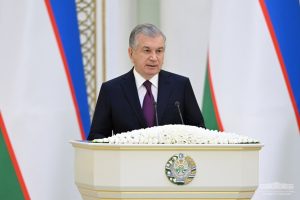Quick on the heels of Uzbekistan’s constitutional referendum, President Shavkat Mirzoyoyev announced on May 8 that the country would hold an early presidential election on July 9.
Mirziyoyev, in his May 8 speech, waxed poetic about the April 30 referendum, proclaiming that its results illustrated that the Uzbek people have “high confidence and full support for the reforms” his administration initiated when it came to power in late 2016.
According to government figures, the constitutional referendum — which altered 65 percent of the Uzbek Constitution — was overwhelmingly approved by over 90 percent of voters. The Central Election Commission said that turnout exceeded 84 percent. The OSCE’s observation mission, however, noted the distinct lack of an opposition campaign, saying the referendum lacked “open debate on some contentious issues” and “took place in an environment short of genuine political pluralism and competition.”
Mirziyoyev essentially phrased his calling for an early presidential election as a personal sacrifice, asking, rhetorically, “Why am I myself giving up the remaining three and a half years of my presidential term?”
One of the most-discussed aspects of the new constitution is the changing of the presidential term from five to seven years and the referendum itself “resetting” the clock on the two-term limit.
Mirziyoyev became president after the death of Islam Karimov in 2016. Under the Uzbek Constitution, the chairman of the Senate, at the time Nigmatilla Yuldashev, should have become interim president — but Yuldashev stepped aside in favor of Mirziyoyev. An election held in December 2016 secured Mirziyoyev his first five-year term and in October 2021 he was re-elected. Prior to the constitutional referendum, Mirziyoyev’s term was to end in 2026 and technically, after two terms, he would not be eligible to run again.
But when it comes to Uzbek presidents, two plus two equals five. Karimov repeatedly tinkered with the presidential term limit math: After being elected in independent Uzbekistan in 1991 he extended his presidency with a referendum in 1996, and then delayed the 2007 election from January to December while the government argued that changes to the constitution reset the clock on he number of terms he’d served. A 2011 constitutional revision shorted the presidential term from seven to five years. Karimov ultimately served four presidential terms that stretched over 30 years.
Under the latest edition of the Uzbek Constitution, and existing government interpretation, Mirziyoyev may remain in power until 2037, baring significant and radical change to the political environment in Uzbekistan.
Mirziyoyev said, among other things, that the constitutional referendum puts before the government “urgent, new political and socio-economic tasks.”
“…[O]nly the people give a mandate to a leader they trust,” he said, justifying the snap election as the seeking of a mandate from the people.
Uzbekistan has never held an election judged by credible international observers as free and fair. While the political environment has, in some ways, changed since the Karimov era, the results remain exactly the same.
In 2019, for example, when the country held parliamentary elections there was a great deal of energy around the slogan “New Uzbekistan.” But despite novel electioneering, including a televised debate between parties, the parliamentary breakdown after the 2019 election was almost exactly the same as the previous body. The political arena remains heavily circumscribed, with little criticism of the government or its policies, no effective opposition, and scant chance for anything resembling a democratic contest of ideas.
More practically, the snap election will secure Mirziyoyev in power and kicks the problematic can of elections down the road by seven more years. It also gives any opposition candidates very little time to mount a credible challenge, if any would even dare to.

































